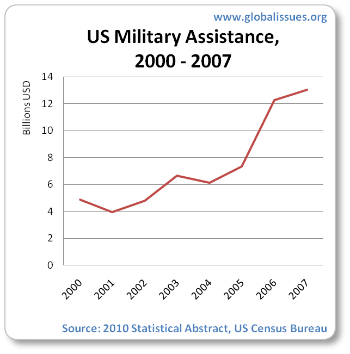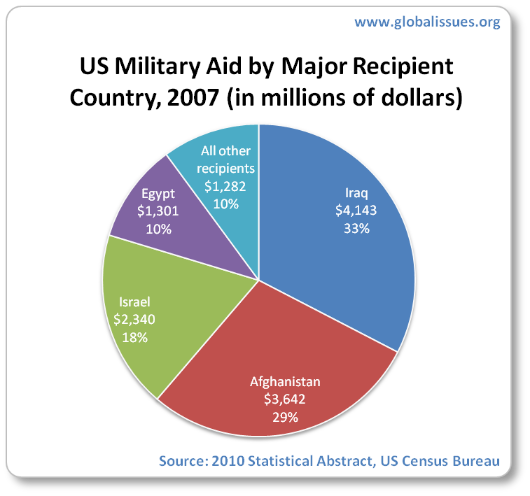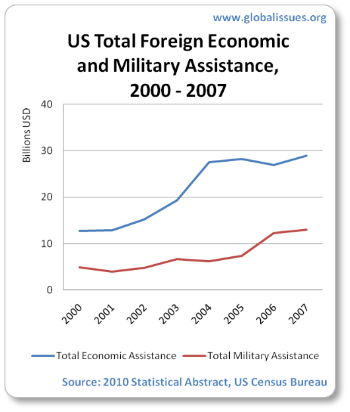Military Aid
Author and Page information
- This page: https://www.globalissues.org/article/785/military-aid.
- To print all information (e.g. expanded side notes, shows alternative links), use the print version:
On this page:
Introduction

Military aid can be controversial. Its stated aim is usually to help allies or poor countries fight terrorism, counter-insurgencies or to help fight drug wars.
The aid may be in the form of training, or even giving credits for foreign militaries to purchase weapons and equipment from the donor country.
It is argued that strengthening military relationships can strengthen relationships between nations and military aid may be a way to achieve that. Where the two nations are democracies, it is believed such relationships can be strengthened even further when the militaries of the respective nations are fully behind the principles of democracy.
But military aid may even be given to opposition groups to fight nations. This could be understandable if the opposition is a potential democratic force standing up against authoritarian rule.
However, as was especially seen during the Cold War, democratic nations (or potentially emerging democratic fledgling nations) often found themselves fighting foreign supported undemocratic forces because of geopolitical goals of the superpowers who tolerated or supported such regimes and dictatorships in order to achieve their own geopolitical aims.
US Military Aid
US military aid is quite large. Official data below from the US government’s Census Bureau, part of the U.S. Department of Commerce, shows the following:

Military aid in recent years has increased, mostly in line with the War on Terror
in Iraq and Afghanistan.
A few years ago, the US invested more in getting Iraq and Afghanistan forces trained and increased military aid accordingly, hence the sharp rise.
Just a handful of countries, mostly in the Middle East, are recipients of military aid:

The source data shows allocation going back a few years, showing other previously large recipients including Colombia (mostly fighting drugs and the FARC rebels, Russia, Sudan and a few others.

While large, US foreign economic aid is larger.
Note, both US foreign economic and military (even when combined) are less than 1% of the nations’ total Gross National Income.
The US’s own military budget is far higher at approximately $700 bn a year currently, discussed further on this site’s military spending section.
Foreign aid — not just from the US — but from most wealthy nations, is controversial for it has often been counter productive, or provided in an inefficient manner, which is discussed further on this site’s section on foreign aid.
During the Cold War, the US often supported anti-democratic regimes in regions such as Central and South America, the Middle East, Asia and even parts of Africa. This was often under the concern (real, faked, or misguided) that Soviet influence could take a foothold in that area. This resulted in fledgling democracies often finding themselves fighting foreign-backed forces which they could often do little about.
In other cases, the US funded opposition groups in order to undermine a Soviet supported government. One such example is Afghanistan, which saw the US’s support for Islamic insurgency (including Osama Bin Laden) to muster local opposition to the Soviet Union. It is believe this strategy helped contribute to the eventual Soviet collapse as they over-extended themselves in Afghanistan, though the blowback
to the US was another consequence. The Middle East and War on Terror sections go into these aspects further.
In more recent times, research organizations such as the RAND corporation are finding that if assistance is being provided to a non-democratic regime, it is only likely to be successful if that regime is transitioning away from repression and towards democracy .
Military Aid from other countries
A number of readers have requested that I write this page, but unfortunately I have not found comparative official data, similar to the US data on military aid. If you come across any, please let me know.
Author and Page Information
- Created:
 Global Issues
Global Issues